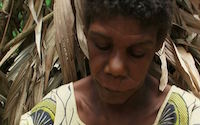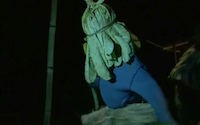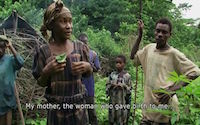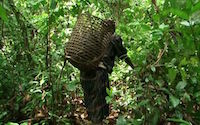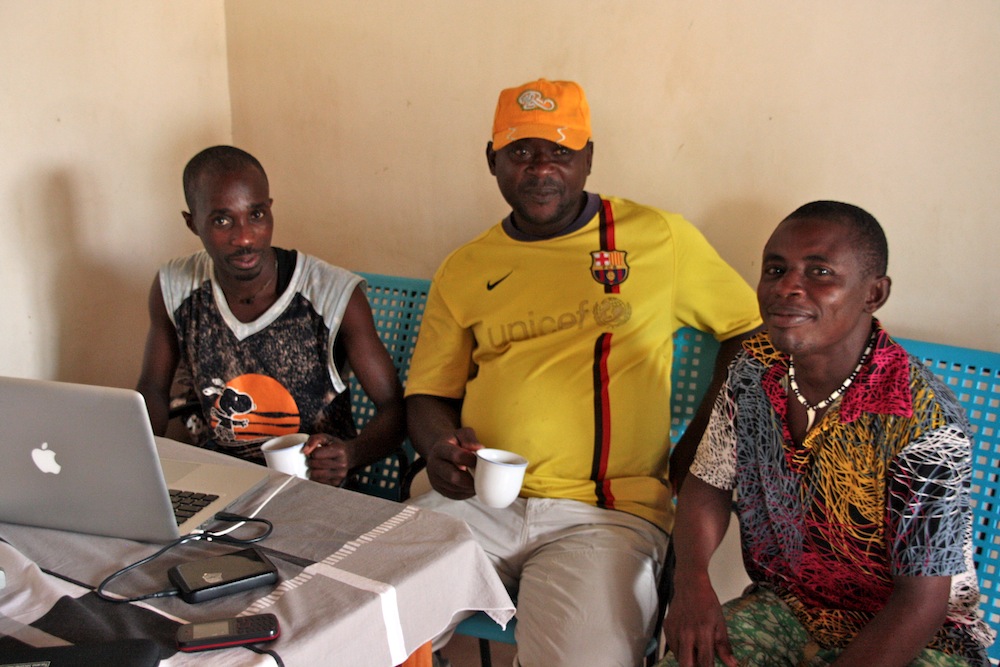The documentation project “A documentation of the Bagyeli/Bakola forest foragers of Cameroon” was funded in its main phase from 3/2010 through 2/2013 (DoBeS #87014) and during an extension phase from 3/2013 through 8/2014 (DoBeS #84353) that Grimm received to finish her dissertation.
Grimm also added more data to the collection during a 2017 field trip as part of her work within the NSF (BCS-1535846) funded “Causality across Languages” project (PI Jürgen Bohnemeyer; https://causalityacrosslanguages.wordpress.com/). Gyeli data for the causality project are deposited in the Endangered Languages Archive at SOAS in the collection “Causality across languages (CAL): Gyeli”.
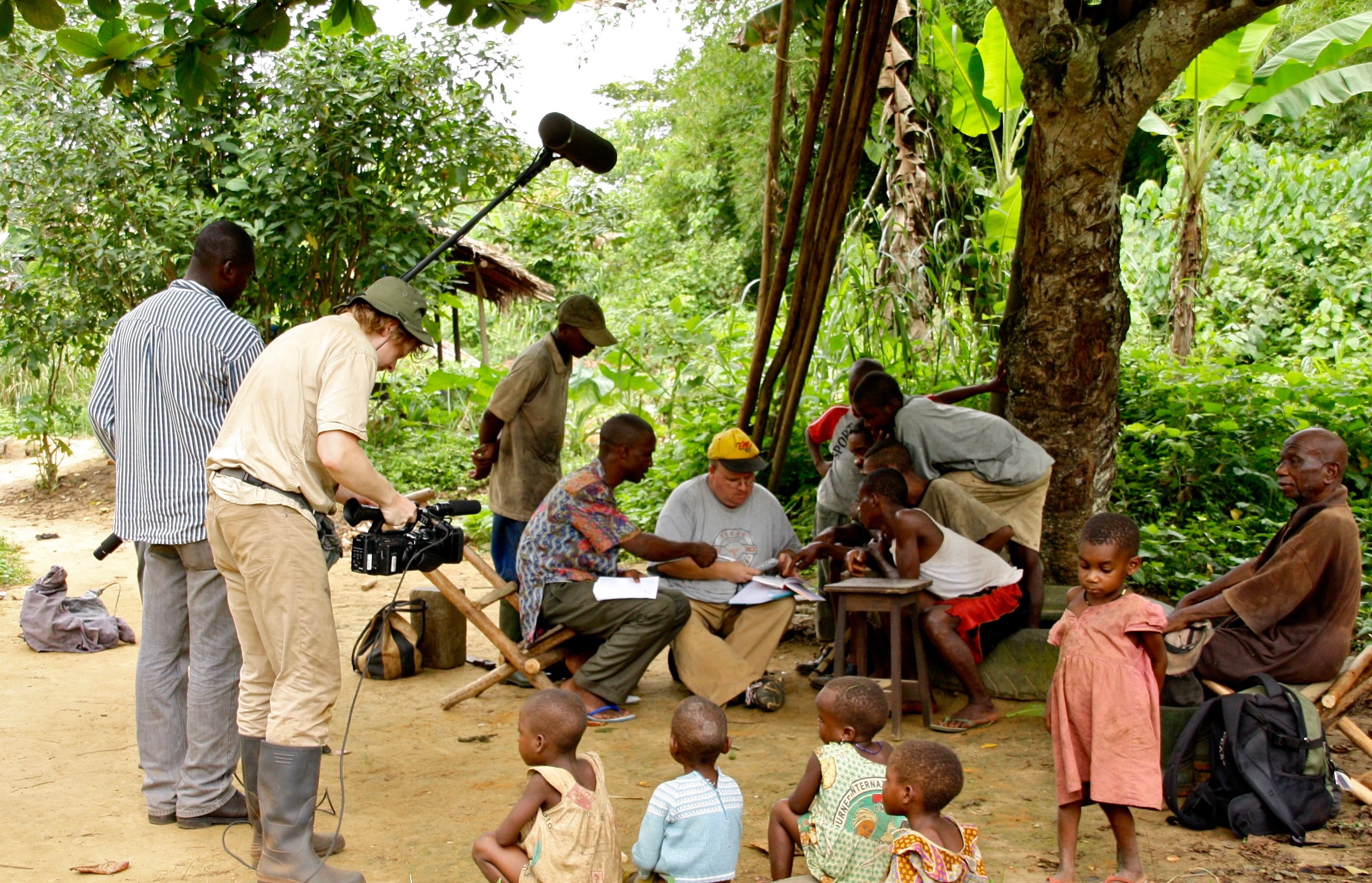
The Gyeli/Kola corpus in The Language Archive has been compiled by Maarten Mous (PI, Leiden University), Emmanuel Ngue Um (postdoctoral researcher at the time), Nadine Grimm (née Borchardt, PhD student at the time of the project), Daniel Duke (PhD student at the time), and Christopher Lorenz (student of image composition and cinematography at the time). While Duke and Ngue Um resided in Cameroon year-round and conducted several short trips to the Bagyeli/Bakola somewhat regularly, Grimm undertook one or two longer field trips each year; Lorenz joined the team to help with video recordings for 2-4 weeks at a time in 2010 through 2012, as well as in 2017. Prof. Mous joined the team in the field once in 2012, working on a special project on approximate and exact numbers used by the Bagyeli in comparison to their farming Bantu neighbors.

Project meeting in Kribi with Maarten Mous, Daniel Duke, Emmanuel Ngue Um, and Nadine Grimm, Aug. 2012
The documentary collection focuses on the endangered forest forager lifestyle of the Bagyeli/Bakola and activities related to their everyday life. It includes a wide range of text genres, such as natural discourse and conversations, interviews, procedural texts (usually including an observational part), folktales, ceremonial songs and dances, as well as stimulus-based experimental data and grammatical elicitations. Naturalistic and semi-naturalistic texts are almost entirely available as video and audio recordings, while the majority of elicitations has been done as audio only; experimental data is mixed. The topics of naturalistic and semi-naturalistic data encompass activities i) in the rainforest, such as hunting, building traps and huts, collecting honey, and describing plants, and ii) in the village, for instance preparing hunted animals, making musical instruments and ceremonial outfits, telling stories, brushing teeth and cleaning the dishes, night recordings of dance and healing ceremonies, or weaving baskets. The recordings also reflect upon the relationship between the Bagyeli/Bakola and the documentation team, capturing their interactions, for example, during greetings, price negotiations, joint walks in the rain forest, and leisure time.
The Bagyeli/Bakola corpus is organized into three sub-collections that align with different Gyeli/Kola dialect zones: Kola in the Basaa (Bantu A40) contact region (Emmanuel Ngue Um), Gyeli in the Bulu (Bantu A70) contact region (Nadine Grimm), and Gyeli in the Kwasio (Bantu A80) contact region (Daniel Duke). While the entire team contributed to data collection in all targeted contact areas, one team member was mainly in charge for one region with respect to transcriptions, annotations, and translations. While almost all of the primary data (audio and video recordings) has been archived for the Bulu contact region by now, data from other contact regions are still being processed. Transcriptions, annotations, and translations are still in progress in all contact regions.
Ada Joseph with Djiedjhie François and Bimbvoung Calvin working on transcriptions
In addition to the documentary corpus, other outcomes of the project include academic papers and presentations as well as documentary films that were publicly shown in a movie theater in Gütersloh, Germany.
Publications
Grimm, Nadine. Under review at Language Science Press. A grammar of Gyeli. (recipient of the Panini Award 2019 of the Association for Linguistic Typology).
Grimm, Nadine. Bare nouns and reference tracking in Gyeli (Bantu). Submitted. In Armoskaite, Solveiga & Martina Wiltschko (Eds.), The Oxford Handbook of Determiners, Oxford: Oxford University Press.
Grimm, Nadine. Implosives in Bantu A80? The case of Gyeli. (2019) In Clem, Emily & Peter Jenks & Hannah Sande (Eds.), Theory and Description in African Linguistics. Proceedings of the 47th Annual Conference of African Linguistics. pp. 135-153. Berlin: Language Science Press.
Grimm, Nadine. (2014) Color categories in language contact: “Pygmy” hunter-gatherers and Bantu farmers. In Carpenter, Kayla et al. (Eds.), Proceedings of the Berkeley Linguistics Society 38, 31-45, Berkeley Linguistic Society, Berkeley, CA.
Presentations
By Daniel Duke:
Introducing the Bakola language documentation project. SIL Cameroon weekly presentation series (FROG Fridays). Yaounde, Cameroon: SIL. September, 2011.
Workflow practices: blockages for new teams. Volkswagen DoBeS Advanced Training Workshop. Nijmegen, Netherlands: Max Planck Institute. July, 2011.
with Emmanuel Ngue Um. Documentation of the Bakola language: Issues and challenges. Volkswagen DoBeS Advanced Training Workshop. Nijmegen, Netherlands: Max Planck Institute. June, 2011.
with Emmanuel Ngue Um. Capacity Building among the Bakola. Volkswagen DoBeS Advanced Training Workshop. Nijmegen, Netherlands: Max Planck Institute. October, 2010.
Lexicography and Language Documentation. Workshop on documentary linguistics, Université de Yaoundé I, Cameroon, organized by Jeff Good (SUNY Buffalo). June, 2010.
Mother tongue education among forest foragers in Cameroon and Central African Republic: three case studies. B.S. Chumbow Symposium. Yaounde, Cameroon: University of Yaounde I. April, 2010.
The Bakola Language Documentation Project in Cameroon. Indiana University Linguistics Club Linguistics at Lunch lecture series. Bloomington: Indiana University. September, 2009.
By Nadine Grimm:
Grammatical tone in Bantu: Insights from Gyeli. African Studies Department Colloquium, Humboldt-Universität zu Berlin, Germany, December 2019
Tone in the grammar of Gyeli. Plenary talk, 13the Conference of the Association of Linguistic Typology, Pavia, Italy, September 2019
Capturing variation in a language documentation corpus. International Conference on Lan- guage Documentation and Conservation 6, University of Hawai’i at Mānoa, March 2019
Capturing linguistic diversity: Grammatical tone in Gyeli. Linguistics Colloquium, University of Rochester, January 2019
The interaction of negation and tense-aspect-mood in Gyeli. 8th Conference on the Syntax of the World’s Languages, Paris, France, September 2018
Bare nouns and reference tracking in Gyeli. World Congress of African Linguistics (WOCAL 9), Rabat, Morocco, August 2018
Bare nouns and reference tracking in Gyeli. African Studies Department Colloquium, Humboldt-Universit ̈at zu Berlin, Germany, November 2016
The role of language documentation in understanding cognitive categories. Cognitive Science Dinner Talk, University of Rochester, November 2016
Definiteness and referentiality in Gyeli (Bantu). Dimensions of ‘D’ Workshop, University of Rochester, September 2016
Expression of mood and modality in Gyeli. Bantu 6, Helsinki, Finland, June 2016
Implosives in Bantu A80? The case of Gyeli. (Poster), 47th Annual Conference on African Linguistics, Berkeley, CA, March 2016
Inchoative as a tense category in Gyeli (Bantu). (Poster), 89th Linguistic Society of America Annual Meeting, Portland, OR, January 2015
Language of perception in Northwestern Bantu. Semantics Circle, Department of Linguistics, SUNY Buffalo, April 2014
Color systems in comparison: “Pygmy” hunter-gatherers and Bantu farmers. 10th Confer- ence on Hunting and Gathering Societies, Liverpool, UK, June 2013
Tense in Gyeli (Bantu A80). 5th Conference on Bantu languages, Paris, France, June 2013
Metatonic tone in Gyeli. Linguistics Colloquium, University of Rochester, March 2014 Language documentation among the Bagyeli hunter-gatherers of Cameroon. Linguistics Colloquium, University of Rochester, May 2013
Connective optionality in Gyeli. 7th World Congress of African Linguistics (WOCAL 7), Buea, Cameroon, August 2012
With Christopher Lorenz. Cooperation between linguists and professional cameramen in language documentation. 20th Afrikanistentag, Cologne, Germany, May 2012
Noun + noun constructions in Gyeli. 20th Afrikanistentag, Cologne, Germany, May 2012
Variability in color naming in some Bantu A languages. 43rd Annual Conference on African Linguistics (ACAL), New Orleans, May 2012
Color categories in language contact: “Pygmy” hunter-gatherers and Bantu farmers. 38th Berkeley Linguistic Society, UC Berkeley, February 2012
Documenting the language of “Pygmy” hunter-gatherers: the case of the Bagyeli in Cameroon. Fieldwork Group, Department of Linguistics, Stanford University, February 2012
Color terms in Bagyeli (Bantu A80). Comparing “Pygmy” and farmer languages. 41st Col- loquium on African Languages and Linguistics (CALL), Leiden, The Netherlands, August 2011
Special challenges in documenting Bakola, a “Pygmy” language of Cameroon. Fieldwork Forum, UC Berkeley, January 2011
The Bakola/Bagyeli of Cameroon. DoBeS/MPI workshop “Hunter-gatherers and semantic categories”, Neuwied, Germany, June 2010
By Emmanuel Ngue Um
with Daniel Duke. When the ‘wrong’ language is being documented: language documentation and language shift among the Bakola. The Seventh World Congress of African Linguistics (WOCAL 7). Buea, Cameroon: University of Buea. August, 2012.
Documentary films
Episode 1: Bibira und die Küstenregion [Bibira and the coastal region]. 55Min in English and in German.
Episode 2: Das zweite Jahr. Unterwegs in drei Sprachregionen. [The second year. Driving through three language regions.] 60min in English and in German.
Episode 3: Bagyeli/Bakola. Jäger und Sammler im Süden Kameruns [Hunter-gatherers in southern Cameroon]. 75Min in English and German.
Contact for the documentary films: http://www.lorenzfilm.de/2007—2011.html

